 "
" Overview
Yo Soy 132 is an ongoing Mexican protest movement centered around the democratization of the country and its media. The demonstrations began as a protest against the presidential candidate Enrique Peña Nieto of the former long-time ruling party Institutional Revolutionary Party (PRI) and the Mexican news media's allegedly biased coverage of the 2012 Mexican general election in favor of Peña Nieto.[1]
Background
On May 11th, 2012, Peña Nieto held a conference at the Ibero-American University in Mexico City, Mexico. During the event, the candidate was questioned severely by the attendees, some of whom showed signs expressing complete rejection of his candidacy. The security personnel on campus made the candidate hide in a restroom until a route to avoid the protesters could be determined.[3] He finally exited the campus with hundreds of students booing him as he left.[4]
One of the protesters at the event captured the chaotic scene with his mobile phone camera, which was uploaded onto YouTube and received nearly a million views. Following the heckling incident, Peña Nieto's campaign insisted that the attendees weren't really students but planted by contending parties to disrupt the event.
Development
Peña Nieto and many of his campaign staffers said this incident was staged by the leftist party candidate Andrés Manuel López Obrador, and that the participants were not real students or that they had been paid. Peña Nieto's team even attempted to counter the student-recorded videos with an edited video from his visit to Ibero-American University, which showed a relatively peaceful campus occupied by the supporters of the candidate.
In rebuttal, Twitter users began using the hashtags #EPNiberroDoesntWantYou and #PRIisSCARED to criticize Peña Nieto's denial. Meanwhile, 131 students who apparently attended the event uploaded a YouTube video showing their student ID cards.
The video went viral on YouTube, giving birth to the slogan and later the Mexican student movement known as "Yo Soy 132" ("I am 132"), which is meant to express solidarity with the 131 students whose voice were nearly silenced by the news media. Shortly after the upload of the video, the phrase "YoSoy132" became a trending topic among Mexican Twitter users, with many students and supporters rapidly mobilizing through the hashtag #YoSoy132.
On May 19th, the first wave of protests swept across Mexico's major cities, led by students and organizations from many different universities and colleges. Mexico's allegedly pro-PRI news networks Televisa and TV Azteca were the primary targets of the protests, as masses gathered outside the headquarters of Televisa. The demonstrations against some of the nation's largest TV networks received real-time coverage through social networking and online news sites. Four days later on May 23rd, another student-led protest against the TV network took place in Mexico City, which led Televisa and TV Azteca to provide extensive coverage of the demonstrations and extend the broadcast of the second presidential debate on June 1st to nationwide.



Rebecca Black Endorses Peña Nieto
On May 30th, Rebecca Black, the viral video star of the 2011 pop single Friday whose mother is originally from Mexico, visited the south-central state of Morelos to endorse Enrique Peña Nieto in a public appearance. Speaking through a translator, the American teenager gave an uninspiring speech on the importance of youth involvement in politics and formally supported the candidate by saying "Peña Nieto is going to do a fantastic job" as future President.
The event was covered by numerous English and Spanish-language bloggers, many of whom struggled to make a logical connection between Rebecca Black and the election campaign in Mexico. Later that day, Latina entertainment reporter Astrid Capon explained in a video blog post that Black's appearance in Morales is linked to her uncle Gustavo Petricioli, who is a city council member for the PRI in the the capital city of Morelos state.
"This girl is not Mexican, she is not well informed," Capon said. "And for the PRI to believe that because she is famous, young people will follow… is almost offensive.”
Online Presidential Debate
On June 1st, members of the Yo Soy 132 movement issued a statement to the Federal Electoral Institute (IFE) demanding the national broadcast of the second presidential debate and a third online debate to be held separately on June 22nd. While the government rejected both demands, the country's two national TV networks agreed to broadcast the debate nationally and all candidates other than Peña Nieto agreed to participate in a debate organized by the movement. The debate was streamed in real time via YouTube and several other sites, as well as a couple of radio stations.
#MusicosconYoSoy132
Beginning in early June, various musicians and celebrities across the country announced their support for the YoSoy132 movement with the hashtag #MusicosconYoSoy132 and released a joint video statement pleading the Mexican news media to remain impartial and honest in the coverage of the presidential election. The notable appearances in the YouTube statement ranged from Mexico City singer-songwriter Natalia LaFourcad to indie-alternative acts like Ximena Sariñana, Juan Manuel Torreblanca, Madame Récamier and Hello Seahorse.
#YoSoy133
On June 8th, a video titled "#YoSoy133" was uploaded via YouTube featuring a group of Mexican teenagers expressing their support for the #YoSoy132 movement, despite their ineligible status to vote in the upcoming election. "We want to tell you, our compañeros, who are now college students, and anyone who may want a change, that 'the 133' is with you," one of the teenagers says in the video, according to the news blog Mexico Voice.[16] Within three weeks of its upload, the video gained more than 95,000 views.
WikiLeaks Releases Evidence
The Mexican voters' growing skepticism towards the news media coverage was further fueled by The Guardian's release of documented evidence on June 6th, which suggested that Televisa received money in exchange for favorable coverage of political candidates. Days later on June 11th, international whistleblower group WikiLeaks produced additional U.S. cable documents supporting the authenticity of The Guardian's report. The arrival of the exposé coincided with another nationwide protest on June 10th, the same day as the broadcast of the second presidential debate.
July 1st Election Turnout
The Mexican presidential election was held on July 1st, 2012.[15] In commemorating the country's first presidential election to be observed in real time through social media, the Mexican edition of Google's homepage featured a doodle on the voting day.

Within 24 hours, several reports of exit polls indicated that Peña Nieto will be elected the next president of Mexico, which was met by split reactions from the PRI campaign team and the members of YoSoy132. After the news media announced similar projection of Nieto's projected victory, thousands of people took their complaints to Twitter, bringing election-related hashtags to worldwide trending topics. Many lamented the return to power of PRI, a long-running political party know for its corrupted past, while others speculated the possibility of voter frauds using the hashtag #fraude2012.
Mexico: Since yesterday, the #YoSoy132 movement is reporting the most documented election fraud in history Check #Fraude2012via @culebrae
— 12M 15M (@12M15M) July 2, 2012
#Fraude2012
Rejection of Election Results
On July 4th, members of Yo Soy 132, as well as representatives of 118 local assemblies and 120 universities gathered at the National Autonomous University of Mexico (UNAM) to discuss their stance on the election turnout and Enrique Peña Nieto's victory. After 10 hours of assembly, spokespeople of Yo Soy 132 announced that they reject the "process by which Enrique Peña Nieto has been imposed to take the Republic’s presidential seat."


Throughout the month of July, several mass-scale marches led by student members of Yo Soy 132 took place in protest against Enrique Peña Nieto's presidency, including one in Mexico City where more than 90,000 demonstrators marched under the slogan "No to imposition." In addition to targeting the president-elect Enrique Peña Nieto and the Federal Electoral Institute (IFE), Yo Soy 132 members also organized a 24-hour symbolic blockade around the facilities of Mexico's major broadcaster Televisa on July 27th, criticizing the media outlet for providing biased coverage to Enrique Peña Nieto during the election campaign.
Search Interest
External References
[1] Buenos Aires Herald – Youth protest former Mexican ruling party's rise
[2] The Guardian – Pressure on Mexican presidential candidate in Televisa media row
[3] SDPnoticias – Y Peña Nieto se escondió en el baño de la Ibero…
[4] CNN México – La visita de Peña Nieto, motivo de abucheos de estudiantes en la Ibero
[5] Reuters – Mexico's Pena Nieto hounded online by youth groups
[6] Politics365 – Mexico’s Young Voters Set a Social Media Standard
[8] Daily Kos – Support Today's Marches Throughout Mexico!
[9] NYTImes – In Protests and Online, a Youth Movement Seeks to Sway Mexico’s Election
[10] Global Voices – Mexico: #YoSoy132 Youth Movement Generates Debate
[11] OC Weekly – Musicos con Yo Soy 132: The Anti-Rebecca Black Pack!
[12] Huffington Post – #YoSoy132: Mexican Elections, Media, and Immigration
[14] The Guardian – Computer files link TV dirty tricks to favourite for Mexico presidency
[15] Washington Post – Mexico elections: Reactions to Peña Nieto’s victory
[16] Blogspot – Mexico Voices
Recent Videos 3 total
Recent Images 72 total
Share Pin
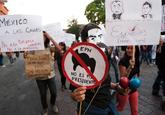
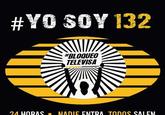


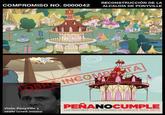
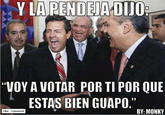




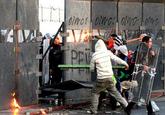
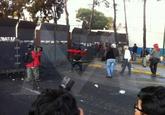

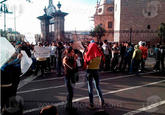



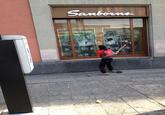
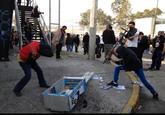

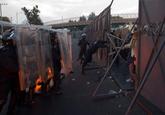

Comments ( 18 )
Sorry, but you must activate your account to post a comment.
Please check your email for your activation code.